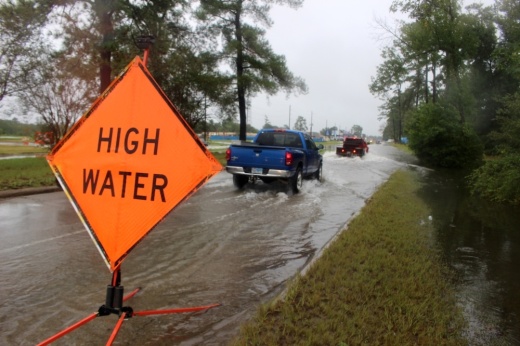Harris County commissioners voted 4-0 to approve an agreement for a $750 million grant from the Texas General Land Office for flood mitigation at a special meeting Aug. 31, with Precinct 3 Commissioner Tom Ramsey not in attendance.
Adrienne Holloway, executive director of the Harris County Community Services Department, told Community Impact Newspaper the $750 million in Community Development Block Grant Mitigation funds are part of an amendment to the GLO’s state action plan to invest in infrastructure improvement in areas damaged by Hurricane Harvey.
“It really is a drop in the bucket in some of the improvements that we need to have made across the county and infrastructure as well as drainage,” Holloway said.
The county will have around 10 years to expend the funds. About $600 million will be available for projects, with the rest going to administration, IT and general project delivery, according to Holloway. Guidelines from the GLO dictate each project must have a minimum budget of $1 million, and 51% of the beneficiaries must be low to moderate income.
“There's an analysis component of [the guidelines] that demonstrates where the greatest improvements can be made, and the beneficiaries that will benefit from those improvements based on a future view of disaster,” Holloway said. “So it's not so much repairing what had been impacted ... from a disaster. It's really, what can we do to better fortify our infrastructure in order to prevent such an impact from future disasters.”
With the CDBG grant funds, the county can chip away at the $1.4 billion gap in funding for the 2018 flood bond program projects. Around $400 million is left in need, Daniel Ramos, executive director of the Office of Management and Budget, said during the meeting.
The Community Services Department has scheduled a public hearing for the grant for Sept. 8 from 5:30 to 6:30 p.m. at 9418 Jensen Dr. to give residents an opportunity to provide input on the method of grant distribution, according to the notification from the Community Services Department. A survey to assess resident needs is available in English, Spanish, Chinese and Vietnamese.
"We'd love more people to be involved in lending their voice to the decisions that we're making," Holloway said. "It's something that I am really trying to make sure that doesn't go without notice. We're trying to get people to be part of this process."
GLO controversy
According to prior reporting from Community Impact Newspaper, the district had anticipated receiving close to $1 billion in federal funding from the U.S. Department of Housing and Urban Development in May 2021. Projects for the 2018 flood bond were initiated under the assumption that $1 billion would come from the GLO.
Instead, the GLO, which administers funds from HUD, announced both Harris County and the city of Houston were excluded from the list of recipients in a competition for CDBG funds, despite having a combined 51% of the population eligible for the grant.
In a March 4 noncompliance letter to the GLO, HUD determined the GLO had violated Title VI of the Civil Rights Act of 1964 and Section 9 of the Housing and Community Development Act of 1974 and had “substantially and predictably disadvantaged minority residents”—particularly Black residents—with two of its scoring criteria for awards.
Multiple speakers from the Northeast Action Collective—an organization focused on issues of inadequate drainage in northeast Houston—voiced concerns at the Aug. 31 meeting over how the $750 million grant would be allocated, saying that projects in Greens and Halls bayous had been historically underfunded.
“We do remember from years past—we have heard beautiful words, have received wonderful promises. We have been encouraged and let down,” NAC representative Carolyn Rivera said virtually. “We are at the point where we are looking and watching for action, not just words. I have lived in Settegast [in Northeast Houston] for 43 years. We understand there are multiple funding streams with various rules and timelines. But in the end, our lives and families are not protected from flooding.”





